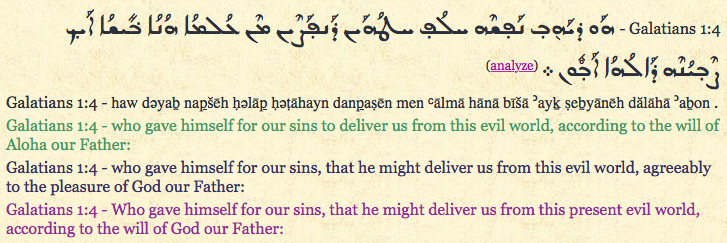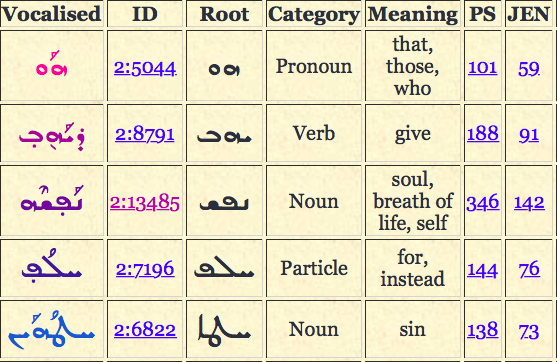In my last post I examined two cases where Brian Simmons claims in his so-called Passion Translation of the bible to be translating from the Aramaic. In Romans 1.11 it would appear that he is justified in his claim, with other English translations of the Peshitta also having ‘gift of the Spirit’ rather than ‘spiritual gift’. But in Romans 1.9, where he has ‘through the revelation of his Son’ rather than ‘in the gospel of his Son’, the Peshitta has ܒܸ݁ܐܘܲܢܓܸ݁ܠܝܼܘܿ (bewangelīāwn), ‘in the gospel’, seemingly belying his claim.
In this post, I begin a more systematic evaluation of Simmons’ claims to be translating from the Aramaic. I hope to examine all such claims in his book Letters from Heaven, which contains his renderings of Paul’s letters to the Galatians, Ephesians, Philippians and Colossians, and I and II Timothy. Here I begin with the first of these claims, contained in a footnote to Galatians 1.4. I am using the Kindle edition.
The Aramaic text is from the Peshitta tool at dukrhana.com. Unless otherwise stated I use the UBS text with Western vowel signs. The three English translations are by Etheridge (green), Murdock (navy), and Lamsa (purple).
As I said in my previous post, I am not here examining the question of why Simmons would prefer to translate from the Peshitta rather than from the Greek original. My overriding concern is to discover whether he is being truthful when he says that he has done so.
Galatians 1.4a
τοῦ δόντος ἑαυτὸν ὑπὲρ τῶν ἁμαρτιῶν ἡμῶν (NA 28)
“who gave himself for our sins” (ESV)
“who offered his soul as the sacrifice for our sins” (Simmons)
“who gave himself for our sins” (all 3 translations)
Analytical tool, here:
Jennings Syriac Lexicon of the New Testament, here:
It can be seen that while the word ܢܰܦ݂ܫܶܗ (napšēh) can mean ‘soul’, it can also just as well mean ‘self’. The entry in the Comprehensive Aramaic Lexicon confirms that it can function as the reflexive pronoun (as ἑαυτὸν does in the Greek text):
In conclusion, therefore, it might be possible to translate the Aramaic text as:
“he gave his soul for our sins”
but there is no necessity to do so. There is no basis in the Aramaic text for Simmons’ ‘offered … as the sacrifice’. The word used just means ‘gave’, as in the three English translations of the Peshitta above:
It seems probable that Simmons has indeed made use of the Peshitta here, in making the change from ‘himself’ to ‘his soul’. But he has not translated from the Peshitta in making the change from ‘gave’ to ‘offered … as the sacrifice’. This part of the ‘Passion’ text seems to come from his own imagination, so far as I can see.
An additional concern
It seems to me that there is a potential danger in changing the text from ‘who gave himself for our sins’ to ‘who offered his soul as the sacrifice for our sins’. It is true that Isaiah 53.10 tells us that the LORD would:
‘make His [the Man of sorrow’s] soul an offering for sin’ [NKJV]
the word used being נֶפֶשׁ (nephesh), which is normally translated ‘soul’, but still it seems crucial to guard carefully against docetism. The Lord Jesus Christ gave His whole self for our sins, as I understand it, not His soul only. Simmons’ rendering might possibly open the door to a docetic interpretation, it seems to me.
UPDATE 20 MARCH 2017:
I have now realised, thanks to a lead proffered kindly by Brian Simmons himself (see this post at the section entitled ‘The mystery solved…’), that Simmons has almost certainly made use of Victor Alexander’s rendering here. There is more on Alexander starting at the same section of the above post. He is a film-maker who promotes a style of ‘Felliniesque’ film-making where ‘dreams and reality are perceived as one experience’. I give reasons in the above post why I think it possible that ‘the manuscript’ Alexander has claimed to be translating from may not actually exist. His work is clearly unreliable and should not be made use of by another translator, especially when he, as in the case of Simmons, has claimed to be working from the Aramaic text itself.
Alexander’s rendering of Galatians 1.4a is:
and his footnote reads:
It looks to me very much as if Simmons has derived the idea of sacrifice from Alexander’s version of the text, and his use of ‘his soul’ rather than ‘himself’ from Alexander’s footnote.
Andrew







One Comment